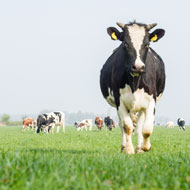Farmers urged to increase vigilance for bluetongue

The disease was detected in three consignments of cattle imported from France.
The UK’s chief veterinary officer Christine Middlemiss is calling on farmers to increase their vigilance for bluetongue virus.
The call comes after the disease was detected in three consignments of cattle imported from France. Two of the consignments were identified in Yorkshire as part of routine post-import testing, while the third was identified at a premises in Northern Ireland.
Defra is now taking steps to reduce further spread of the disease, with movement restrictions at the affected premises. Furthermore, all infected cattle in Yorkshire will be humanely culled, together with one other infected animal that had travelled in the same vehicle.
“Farmers must be aware of the risks of bringing animals from disease-affected areas into their flocks and herds. It is vitally important that we keep this disease out,” said Ms Middlemiss.
“This detection is a further example of our robust disease surveillance measures in action, but I urge farmers to remain vigilant. They need to work with importers to make sure effective vaccination needs are complied with and that all animals are sourced responsibly.”
Transmitted by midge bites, bluetongue affects sheep, goat, cattle and other camelids. While the disease does not threaten human health or food safety, it can lead to infertility and reduce milk yield in livestock. In the most severe cases, bluetongue virus can be fatal.
As part of government efforts to reduce the spread of bluetongue, farmers are being urged to discuss their needs with their veterinary surgeon and to consider the health of animals before deciding to import stock from Bluetongue-affected regions.
‘Importers should be aware that all cattle and sheep arriving in the UK from countries where bluetongue is known to be circulating will be restricted until post-import testing is carried out and the animals are confirmed as compliant,’ Defra said in a press release.
‘Any animals which are infected with bluetongue will be culled and no compensation will be paid. Any animals in the consignment which are at risk of becoming infected may also be culled.’



 The RCVS has announced a new version of its 1CPD mobile app, with enhanced features for veterinary surgeons and veterinary nurses to record their continuing professional development.
The RCVS has announced a new version of its 1CPD mobile app, with enhanced features for veterinary surgeons and veterinary nurses to record their continuing professional development.